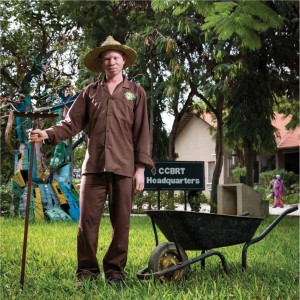The Danger of Misconception
The plight of Tanzanians living with Albinism
Last week, the Tanzanian Government announced a ban on witchdoctors (individuals who practice magic in order to heal illness or bring good fortune). This announcement followed the abduction of a four-year-old girl with albinism. An armed gang snatched the girl from her home because of misguided beliefs about her condition. She was abducted one month ago. She is still missing.
“Banning witchdoctors is not the only thing needed to stop the killing of albinos. The killing of albinos might decrease, but it will not end completely…Of course, families will try and protect albinos in their family. But someone will come and offer millions of shillings [thousands of dollars] for that albino so they can use their limbs for rituals. It is so much money that a family member will sell the albino. It only takes one person in the family to focus on the money and not the person.”
– Abdallah, CCBRT Gardener, person living with albinism
Witchdoctors still have a strong following in many Tanzanian communities, and traditional methods of healing are often the first port of call in a time of need. This is particularly true in remote rural communities, where modern medical care is considered expensive, difficult to access, and may not be trusted.
In Tanzania, it is estimated that more than 33,000 people live with albinism[1], an impairment affecting the production of melanin (the chemical that gives the skin its color). It is a genetic condition with no cure. Despite various health complications that can occur as a result of albinism, including eye and skin conditions, people with albinism are able to live a full and active life. Tragically, misconceptions around the condition within the Tanzanian community lead people with albinism to be brutally targeted. Witchdoctors claim that the limb, hair, skin or blood of a person with albinism will bring wealth and good fortune. As a result, at least 73 people in the last three years have been murdered and many more maimed in savage attacks[2].
Kupona Foundation applauds the Government of Tanzania as they address these murders and provide additional protection for Tanzanians living with albinism. However, while a ban on witchcraft may help to deter the communities involved and reduce the ‘demand’ for the murder of people with albinism in Tanzania, there must be a parallel effort to address the misconceptions that are the driving force behind these murders.
Abdallah has been working as a gardener for our partner, CCBRT, since 2013. (You can read more about his story here) As an individual living with albinism, Abdallah is not optimistic that a ban on witchcraft alone will eradicate the violence against people with albinism.
As we reach a pivotal point in international development with the expiry of the Millennium Development Goals in December 2015, we are encouraged by the focus that has been placed upon education in the upcoming Sustainable Development Goals. Improving access to the facts surrounding important health and social issues, including albinism and other impairments, will broaden societal understanding of the issues, so those targeted will no longer need to live in fear.
Interested in learning more about CCBRT’s advocacy program? Take a look at the summary in the 2013 Annual Report .
[1] http://www.bbc.co.uk/news/world-africa-30794831
[2] http://www.huffingtonpost.com/2015/01/15/tanzania-witch-doctors_n_6479802.html


